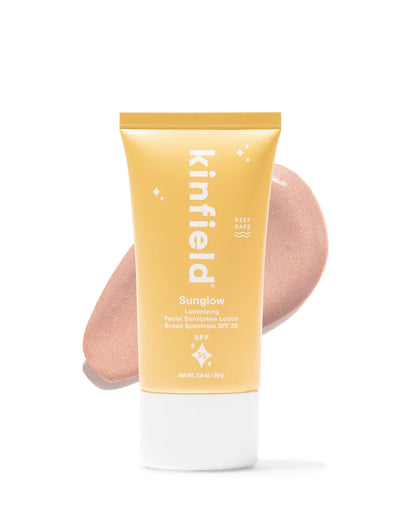Understanding Oily Skin
Our skin produces a very specific type of oil- or Sebum as it is technically referred to which has proven to be a fairly misunderstood and somewhat mysterious substance. It catches a lot of heat for issues like acne and is generally something people try to actively rid themselves of. What if I told you that your oily skin is not solely to blame for your breakouts and that the “oil free” moisturizers and foaming cleansers that are specifically marketed to your oily skin may be causing your skin to be extra oily and contributing to any breakouts you are experiencing?
But is it oil?
To understand this overall confusing situation, we need to understand a few basics about our skin; such as overall skin health which starts with the health of our skin barrier.
Our bodies are made up of 60% water but our skin is actually a very effective barrier and we only lose 300 - 400 mL of that water per day; that’s just over a cup of water lost through our skin per day. In addition to retaining this water to store up hydration so that all of our organs (including our skin) can function properly, our skin barrier also acts to keep external aggressors out. Now it’s obvious at this point that our skin itself is a very large and very effective barrier, but part of what makes it a successful barrier is a separate thin barrier on the outermost part of our skin itself made up of lipids or fats, that essentially lock in hydration.
Think about a jar of water that you have added oil to.

That oil settles on top of the water, protecting it and preventing the water from evaporating, almost as if you had put a lid on the jar. Remove that oil and the water more rapidly evaporates into the atmosphere. This is similar to what happens with your skin.
Now think about what happens when you use a foaming cleanser with a harsh surfactant (the ingredient that makes it bubble or foam) to effectively remove all of the oil from your skin, the same way you would remove oil or grease from a dirty pot or pan. Those soapy bubbles work well and as intended to get rid of all of your oil, but that includes this protective barrier and any moisture that it was keeping locked in. Our cells need moisture in order to function, without moisture the skin will experience obvious dryness which leads to things like accelerated aging, conditions like eczema, psoriasis and atopic dermatitis. If acne is present, because wounds heal best in a moist environment, that acne will be slow to heal and sure to leave behind scarring or dark mark and an uneven skin tone. In fact, in recent studies our oil levels and even our hydration levels have been shown to directly affect the diversity of our skin’s microbiome! Something we are slowly discovering is paramount to healthy skin.
"Our cells need moisture in order to function, without moisture the skin will experience obvious dryness which leads to things like accelerated aging, conditions like eczema, psoriasis and atopic dermatitis."

Many people who claim to have oily skin often report that this oil worsens over the course of the day. Particularly women who wear makeup are conscious of it appearing to “melt” off of their skin as the day progresses regardless of using products that are specifically formulated and marketed to dry up this oil. The truth of the matter is that the more “drying up” of your natural oil you do and the more you wind up compromising your skin’s natural barrier and the more moisture that will inevitably be lost through the skin.
Often times this loss of water is then confused with oil, which perpetuates a cycle of dryness and abuse as far as basic skin health is concerned. In fact, most people with “oily” skin complain of being “oily, yet dry” which makes sense considering how much moisture is lost in a misguided conquest to combat and manage “oily” skin.
But what if it really is oil?...
I won't lie, it is so common to see skin with excessive transepidermal water loss passing as "oily skin" that it can sometimes be easy to forget that some people just really are oily! But it's okay because figuring out if you really are oily or experiencing water loss is just a matter of repairing your skin barrier (here's how to do that). Best case scenario you improve skin health and your "oil" is no longer an issue. Worst case scenario you are still oily but with healthier skin at which point you can then more confidently tackle to real problem.
The causes of increased oil in the skin can be internal, external, genetic, or a little bit of all of it as is commonly the case. Hormones including cortisol, insulin fluctuations, lifestyle, diet and environment can all play a role. An attempt to "dry up" oil and subsequently stripping the skin can then also lead to ramped up oil production. In addition to producing more oil, when we focus on drying out our skin we leave it vulnerable and slow to heal. If your oil is in fact contributing to acne then this approach will also lead to scarring or those red or brown marks left behind once active acne has healed. If your acne is taking more than a few days to heal then your skin is too dehydrated and unhealthy to properly heal it.
So what can be done?
-
By now you have hopefully realized that ingredients which dry up or absorb existing oil are not ideal. On the other hand, certain ingredients can help regulate oil production. Mandelic acid is a great option but should be used sparingly, as too much can make matters worse. Ingredients in Corthe's first aid lotion are fantastic at managing oil, but steps should still be taken to ensure hydration levels and barrier health is properly supported.
-
Supporting the skin barrier is crucial to healthy skin, you can read more about this here. Often times, just by using ingredients and products which support our barrier and eliminating things that do it harm, we end up fixing any issues with excessive oil we may have. “Barrier Support and Barrier Repair” are marketing terms when it comes to products and many products on the market don't actually do a thing other than create a superficial barrier on the skin... which isn't ideal. Our skin barrier is made up of a balance of Ceramides, Cholesterol and Fatty Acids so using a product like Hale and Hush's Vital Lipid Lotion which actually supports the skin in producing its own ceramides can drastically help to improve skin barrier function.
-
Consider an oil cleanser. It might sound counterintuitive, but like attracts like, so when excessive oil is a problem an oil cleanser can do wonders. Excessive oil can also dilute the linoleic acid levels on our skin so using a product rich in linoleic acid can help to restore skin barrier health while also regulating your oil and removing existing oil. Michele Corley's Cleansing Oil paired with Hale and Hush's Clear Future Toner which contains Niacinamide to help regulate oil production, make to perfect pair to address oily skin.
-
Eat a diet rich in omegas and anti-inflammatory foods while also limiting your intake of inflammatory foods. This will not only help with excessive oil production, but with your overall skin health. Nordic Naturals is one of the top brands to aid in overall health which undoubtedly includes your skin but a good evening primrose oil can also help balance the composition of the oil your skin produces to ensure it isn't causing unnecessary issues. Did you know you can get 10% off of all supplements by shopping on Fullscript? You are also able to browse my recommended supplements for all things skincare and acne. Check it out here
About the Author:

Dru Pattan is a Licensed Esthetician with a background in cosmetic chemistry, specializing in acne and compromised skin through a barrier first approach. Her philosophy centers on supporting the skin’s natural function rather than forcing it into submission, focusing on long term health over quick fixes.
Her own journey with severe cystic acne sparked her career and remains her most challenging case to date. This personal experience, combined with over a decade in practice, drives her commitment to understanding the science of skin on a deeper level. She has pursued advanced education relentlessly, refining her methods through continual study and practical application.
In addition to her clinical work, Dru is a contributing writer for Dermascope magazine and an advocate for elevating education within the esthetics community. Whether working with clients or mentoring professionals, her goal is to bring clarity, science, and compassion to an industry often clouded by misinformation.




Leave a comment